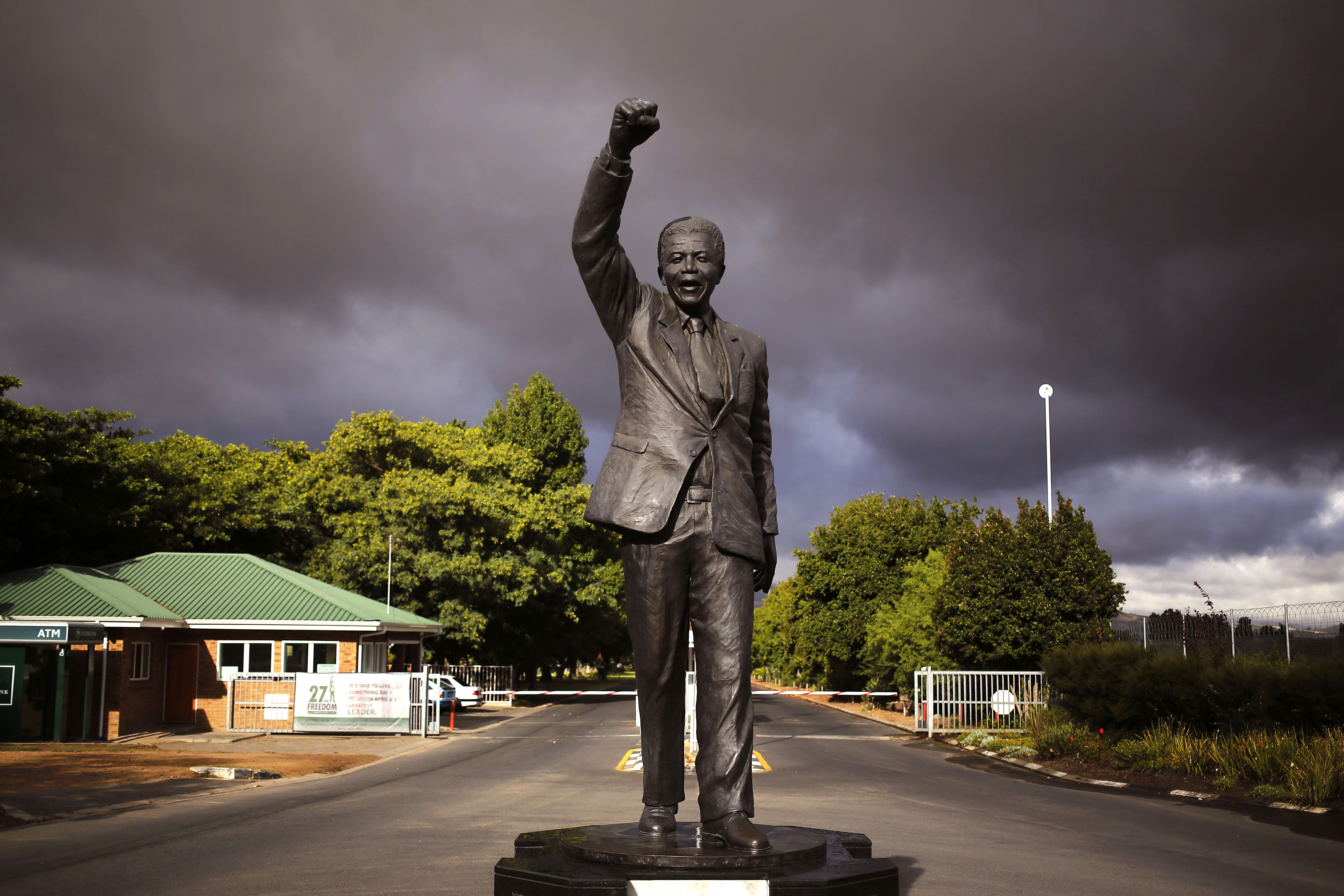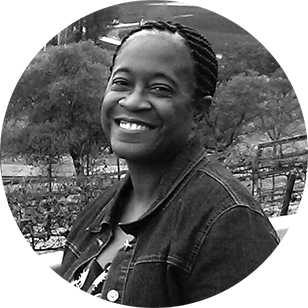Walking in Mandela's footsteps
I visited South Africa to retrace Nelson Mandela's life. This is what I learned.


A free daily email with the biggest news stories of the day – and the best features from TheWeek.com
You are now subscribed
Your newsletter sign-up was successful
I don't remember when exactly I bought my Nelson Mandela T-shirt, but I wore it until it was frayed and lost its color. It was the first and only political T-shirt I ever bought. I had long admired the South African president — his strength, his sacrifice.
I, like many people in America, watched the saga of apartheid in South Africa play out in the media. It was the first time something miles and miles away truly captured my attention, and it hurt my heart.
Maybe it was because the story was so familiar. The struggle for freedom and rights in South Africa in many ways mirrored the Civil Rights Movement in the U.S. I was too young to grasp the full significance of what was going on in the 1960s here in America, but South Africa's fight came about at the same time I was becoming a conscious young woman. When the U.S. finally took a stand, and multinational companies and universities and colleges divested from South Africa, I was relieved. I was proud that this country was not going to stand idly by and let business continue as usual.
The Week
Escape your echo chamber. Get the facts behind the news, plus analysis from multiple perspectives.

Sign up for The Week's Free Newsletters
From our morning news briefing to a weekly Good News Newsletter, get the best of The Week delivered directly to your inbox.
From our morning news briefing to a weekly Good News Newsletter, get the best of The Week delivered directly to your inbox.
All the while, I was rooting on the sidelines for the people of South Africa — and for Mandela. Born into the Madiba clan in South Africa on July 18, 1918, Mandela doggedly pursued his education, working his way through to the University College of Fort Hare. But before he could earn his degree, Mandela was expelled from the school for joining a student protest — the first major sign of his activist streak. After eventually completing his studies at the University of South Africa, Mandela joined the African National Congress in 1944.
After apartheid began in South Africa in 1948, Mandela became an increasingly prominent figure in the anti-apartheid movement. In 1956, he was arrested for the first time and charged with treason. He was eventually found not guilty, but the experience spurred him to take increasingly fierce action, and he eventually left South Africa to receive military training abroad in preparation for the coming armed struggle. Upon returning to his country in 1962, Mandela was arrested once again. This time sentenced to life imprisonment, it was the beginning of nearly three decades behind bars.
On the eve of what would have been the late Mandela's 100th birthday — he would've hit the century mark Wednesday — I wanted to know more. So in May, I visited South Africa, on a trip sponsored by the country's tourism bureau. There, I retraced Mandela's footsteps.
The first place I cried was the Old Fort Prison Complex, where Mandela was imprisoned for more than a year. The prison compound's unforgiving conditions — from the deplorable bathroom facilities that afforded no privacy to the dirty, overcrowded cells and the meatless porridge that passed for food — were borderline inhumane. The stories the guide told about the abuse were harsh on the ears and harder on the heart. I had to walk away from time to time. And yet, one anecdote from Mandela's imprisonment at Drakenstein stands above all the abuse: He was such a gentle man, the story goes, that when he found a mouse in his living quarters at Drakenstein he asked that it not be killed. Instead, he tailed the man who captured the rodent to ensure that it would be safely released into the wild.
A free daily email with the biggest news stories of the day – and the best features from TheWeek.com
For most of Mandela's fellow prisoners at Drakenstein, they were incarcerated there because they fought for freedom, not because they were murderers or thieves. And while I wasn't able to visit Robben Island, where Mandela served 18 of his 27 years of imprisonment, the effect at Drakenstein was no less haunting: He was still a prisoner, confined to the cottage he was assigned.
I imagined what it must have felt like to be so close to freedom, yet so far. Mandela was known to read voraciously every day, but in jail he was barred from making real progress on the ground. For a man of action, this must have felt akin to being outfitted with a straitjacket. The thought made me desperately sad.
Visiting Mandela's humble home in Soweto, at least, was a more hopeful affair. There, I could pore over a collection of Mandela's original books, including H.T. Hobhouse's Morals in Evolution and Horst Drechsler's Let Us Die Fighting: Namibia Under the Germans, and see pictures of the man with his dog, and one of his wife Winnie. The thoroughly quotidian possessions stashed at the house present visitors a glimpse into the life of a seemingly ordinary man. But one look at the line of flowers, hand-painted rocks, and other trinkets left by admirers at Mandela's mansion in Johannesburg makes clear how beloved he still is — and how his very extraordinary legacy lingers in the country.
I was also able to visit the law office in Johannesburg that Mandela shared with Oliver Tambo, as well as Liliesleaf, a farm tucked away in the Johannesburg suburb of Rivonia that served as a secret meeting place for freedom fighters. But perhaps my most emotional reaction came at the site in Howick where Mandela was captured. Just understanding the historical gravity of the setting — to know that this was the place that changed Mandela's life forever — was moving.
Today, the site is marked by the Nelson Mandela Capture Site Apartheid Museum. Outside the building, the "Long Walk to Freedom" pathway snakes along before depositing its followers at the spectacular "Release" sculpture. Standing in front of the 50 vertical bars, it was there that I made my peace with all that I'd seen.
The histories of South Africa and the U.S. are not without parallel. Both nations continue to battle issues of race — and if anything, it seems that America is regressing on the issue. Martin Luther King Jr. and the Civil Rights Movement are etched in the history books, but even after eight years of Barack Obama's presidency, many African-Americans are wondering how far we've really come.
What I take away from walking in Mandela's footsteps is that it's time to quit talking and start doing. Hearing the stories of how people in South Africa fought and sacrificed to attain freedom, I had to confront the truth that I am complacent — comfortable just complaining over cocktails with friends. We spend a lot of time talking politics, but we mostly don't actually do very much other than vote. I felt guilty. Will I continue to sit on the sidelines running my mouth, or find a way to make a difference?
While I was walking through the Apartheid Museum in Howick, I felt the overwhelming weight of sadness and struggle. But I tried to focus on the end of the story: Eventually, freedom came.
Sheryl Nance-Nash is a freelance writer specializing in personal finance, travel, lifestyle, and business topics. Her work has appeared in a variety of publications, including Money, Forbes, The New York Times, Newsday, Daily Finance, US News Travel, Orbitz, Upscale Magazine, amNY, Travelzoo, The Tennessean, Williamsport Sun-Gazette, The Daily Meal, among others.
-
 Local elections 2026: where are they and who is expected to win?
Local elections 2026: where are they and who is expected to win?The Explainer Labour is braced for heavy losses and U-turn on postponing some council elections hasn’t helped the party’s prospects
-
 6 of the world’s most accessible destinations
6 of the world’s most accessible destinationsThe Week Recommends Experience all of Berlin, Singapore and Sydney
-
 How the FCC’s ‘equal time’ rule works
How the FCC’s ‘equal time’ rule worksIn the Spotlight The law is at the heart of the Colbert-CBS conflict
-
 Epstein files topple law CEO, roil UK government
Epstein files topple law CEO, roil UK governmentSpeed Read Peter Mandelson, Britain’s former ambassador to the US, is caught up in the scandal
-
 Iran and US prepare to meet after skirmishes
Iran and US prepare to meet after skirmishesSpeed Read The incident comes amid heightened tensions in the Middle East
-
 Israel retrieves final hostage’s body from Gaza
Israel retrieves final hostage’s body from GazaSpeed Read The 24-year-old police officer was killed during the initial Hamas attack
-
 China’s Xi targets top general in growing purge
China’s Xi targets top general in growing purgeSpeed Read Zhang Youxia is being investigated over ‘grave violations’ of the law
-
 Panama and Canada are negotiating over a crucial copper mine
Panama and Canada are negotiating over a crucial copper mineIn the Spotlight Panama is set to make a final decision on the mine this summer
-
 Why Greenland’s natural resources are nearly impossible to mine
Why Greenland’s natural resources are nearly impossible to mineThe Explainer The country’s natural landscape makes the task extremely difficult
-
 Iran cuts internet as protests escalate
Iran cuts internet as protests escalateSpeed Reada Government buildings across the country have been set on fire
-
 US nabs ‘shadow’ tanker claimed by Russia
US nabs ‘shadow’ tanker claimed by RussiaSpeed Read The ship was one of two vessels seized by the US military
